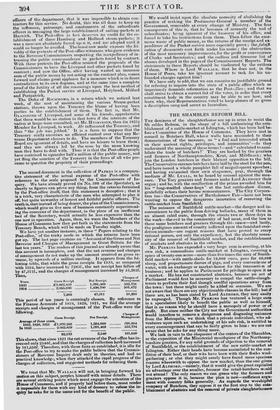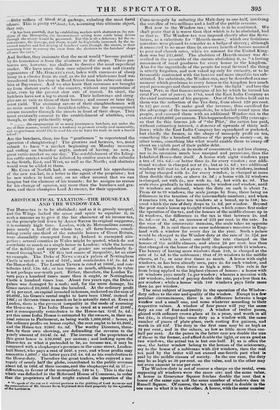THE SHAMBLES REFORM BILL.
THE denizens of the slaughterhouse are up in arms to resist the Sh ,mbles Reform, in the shape of a bill authorizing the esta- blishment of a cattle-market at Islington, which has been laid be-
fore a Committee of the House of Commons. They have met in council in Butchers Hall, whose walls have resounded to their denunciations of the measure, as " a foul and interested attack on their ancient rights, privileges, and immunities"—do they understand the meaning of these terms ?—and" calculated to anni- hilate the trade of butchers !" They are backed by the graziers and farmers of Northamptonshire, Kent, and Middlesex ; who join the London butchers in their blatant opposition to the bill. The Conservative carcass-butchers have laid by the steel for the pen, and have issued a whole pamphlet full of magniloquent speeches;
and having exhausted their own eloquence, pray, through the medium of Mr. LYALL, to be heard by counsel against the mea- sure. The Tory graziers and farmers make Lord ALTHORP their
organ ; and he, with the recollection of the prizes awarded him for his " long-woolled shear-hogs" at the last cattle-show dinner, gratefully echoes their bovine remonstrances. The City Corpora- tion too—the Conservatives of Bartholomew Fair—have not been wanting to oppose the dangerous innovation of removing the cattle-market from Smithfield.
The nuisance of Smithfield cattle-market—the danger and in- convenience to the public from driving bullocks, many of them is an almost rabid state, through the streets two or three days in the week—the evil to the community of bad meat, and the loss to these same butchers and graziers through this cause—and lastly, the prodigious amount of cruelty inflicted upon the famished over- driven animals—are cogent reasons that have proved to every rational person, not only the expediency, but the absolute neces- sity of the removal of Smithfield market, and the establishment of markets and abattoirs in the suburbs.
Mr. PERKINS has expended a very large sum in erecting, at his own risk, a commodious cattle-market at Islington, covering a space of twenty-one acres—more than five times the area of Smith- field market—with cattle-sheds for 10,000 oxen, pens for 40,000 sheep, and proportionate droves of pigs, and every convenience of water, with an exchange or market-house for the transaction of business; and he applies to Parliament for privilege to open it as a market. He has not constructed abattoirs, because an act of Parliament would first be necessary to compel the cattle-slaugh- terers to perform their foul though needful operations away from the town : but these might easily be added on occasion. We are not aware that there are any objectionable clauses in the bill ; but if there are, as has been stated by Lord ALTHOZP, they may easily be expunged. Though Mr. PERKINS has ventured a large sum in a speculation likely to benefit the public as well as himself, that is no reason why he should have a monopoly of power or of profit. But since neither the City nor the Government authorities would interfere to remove a dangerous and disgusting nuisance from the Metropolis, we think that a private individual, who ad- ventures upon such an undertaking at his sole risk, is entitled to every encouragement that can be fairly given to him : we are not aware that lie asks for any thing more.
We look in vain to the eloquence of the orators of the Shambles, or the exposition of the Ministerial mouthpiece of the Northamp- tonshire graziers, for any solid grounds of objection to the removal of Smithfield, or the establishment of the new cattle-market at Islington. Either their heads have become assimilated to the con- dition of their beef, or their wits have been with their flocks wool- gathering ; or else they might surely have found more specious reasons wherewith to oppose the new market, than the one given by Lord ALTHORP, —namely, that it would give the great capitalist an advantage over the smaller, because the retail-butchers would not attend The only reason we can guess why the farmers and graziers oppose it is, because the plan is new—sufficient argu- ment with country folks generally. As regards the worshipful company of Butchers, they oppose it as the first step to the esta- blishment of abattoirs and the removal of private slaughterhouses tellers of blood. ,ar.id garbage, exhaling the most fcetid odours. This is pretty evident; for, assuming this ultimate object, they say, " It has been assertet% that by establishing markets with abattoirs on the out- skirts of the Metrorolis, the inconvenience arising from cattle being driven through the street.: would be prevented. But this is all a delusion; for the in- convenience, the daniNge, and alarm, would be frightfully increased, by the in- creased number and first driving of butchers' carts though the streets, in their necessary haste to convey the meat from the abattoirs to the butchers' shops all over the town."
And further, they insinuate that the meat would "become putrid" by its transmissi n from the abattoirs to the shops. These pre- tences are, however, too shallow to deceive the most superficial reader. We have more than once admired the neat and cleanly appearance of Mr. GIBLETis cart, laden with carcasses of sheep hung in a cluster from its roof, as its fat and wholesome load was transferred into his shop in Bond Street from his suburean sham- bles at Bayswater. And we also know that carcasses are brought up from distant parts of the country, without any imputation of taint, even by the present slow rate of transit. In short, the butchers have not a leg to stand on. Their bellowings and strug • gles are as vain as those of their beeves; and sooner or later they must yield. The steaming savour of their slaughterhouses will no more ascend to their breakfast-tables, nor the ensanguined stream meander through the streets in front of their shops. They must eventually consent to the establishment of abattoirs, even though, as they pathetically urge, cr the congregation of so many journeymen butchers, not under the eye of their masters, would have a tendency to promote cruelty and immorality, and no gentleman would lac to send his son to learn his trade in such a horrid school ! "
Are the butchers, then, too fine " gentlemen " to superintend the operation of slaughtering? The graziers and farmers, too, must submit to have " a market beginning on Monday morning and ending on Saturday night, instead of having, as now, a great cattle-market on one day." The establishment of the Isling- ton cattle-market would be followed by similar ones in the suburbs to the South, East, and West, as well as the North; and abattoirs would soon be added to them.
Mr. COKE of Norfolk had, it seems, expressed his approbation of the new market, in a letter to the agent of the proprietor; but be new wishes to back out, on no other account that we can imagine but the clamour of his tenants : for he assigns no reason for his change of opinion, any more than the butchers and gra- ziers, and their champion Lord ALTHORP, for their opposition.























 Previous page
Previous page